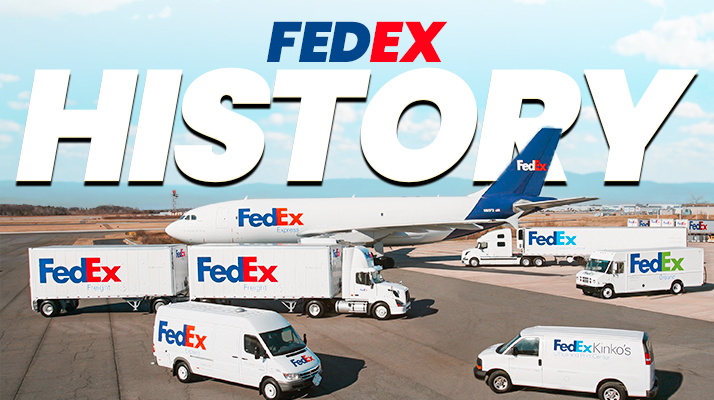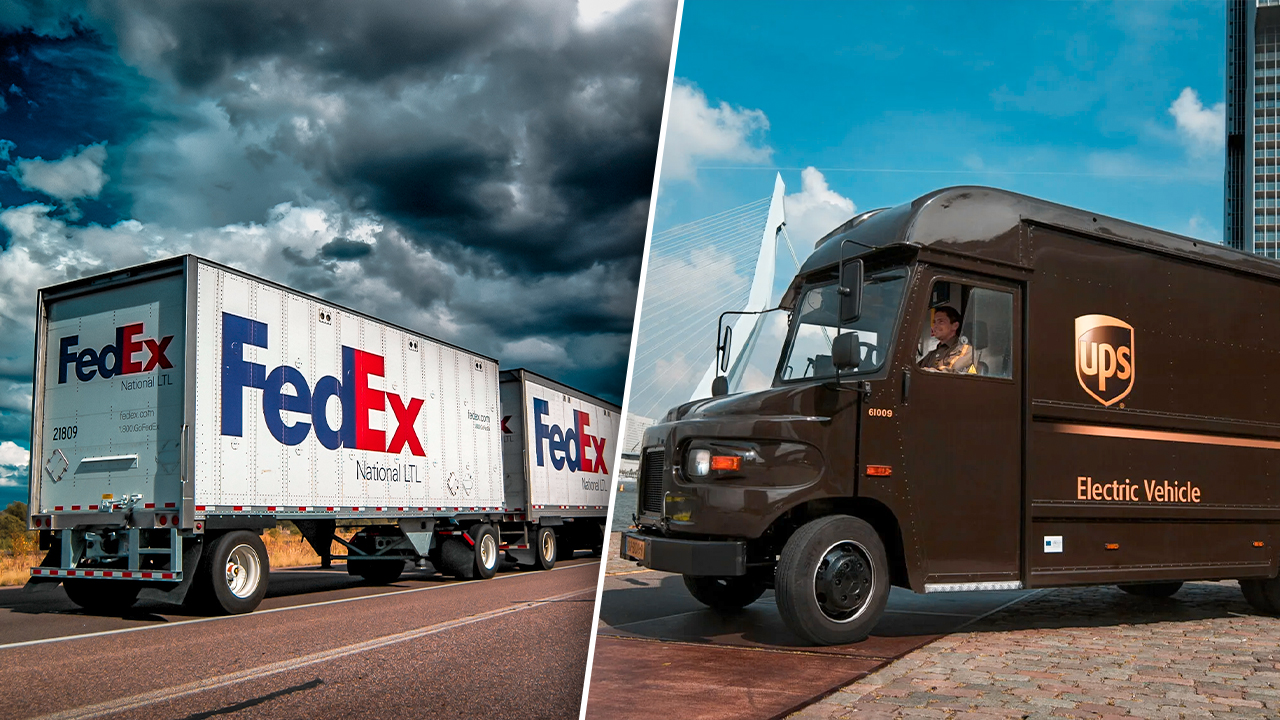Who is bigger fedex or ups
How Do UPS and FedEx Compare in Terms of Revenue?
- UPS's Revenue
- FedEx's Revenue
How Do UPS and FedEx Compare in Terms of Market Share?
- UPS's Market Share
- FedEx's Market Share
Which Company Has a Larger Fleet?
- UPS's Fleet
- FedEx's Fleet
Which Company Has a Larger Global Presence?
- UPS's Global Presence
- FedEx's Global Presence
Which Company Has a Better Reputation?
- UPS's Reputation
- FedEx's Reputation
When it comes to package delivery and logistics, UPS and FedEx are two giants that dominate the industry.
Both companies offer a wide range of services, but how do they compare?
This article examines their offerings, including revenue, market share, fleet size, global presence, and reputation.
By the end, you’ll have a clearer understanding of which company stands out in the competitive world of shipping.
1. What Are The Services Offered By UPS?
United Parcel Service (UPS) offers a diverse range of delivery services tailored to meet the needs of various customers, including both corporate clients and local businesses. Known for its operational efficiency, UPS provides logistics solutions that emphasize package tracking, reliable e-commerce shipments, and various delivery speeds, such as next day and same day service. With a commitment to customer service, UPS utilizes a fleet of ground vehicles to ensure timely deliveries across the United States and internationally. Their services also include specialized solutions for small packages and freight services, catering to a broad spectrum of business models.2. What Are The Services Offered By FedEx?
FedEx provides a wide array of delivery services designed to cater to both domestic and international needs, emphasizing express service and reliability. With a stronghold in the air freight sector, FedEx has become a key player in the logistics solutions market, especially for e-commerce shipments. Their package tracking system enhances the customer experience by providing real-time updates, which is crucial for businesses and individual customers alike. Additionally, FedEx is committed to sustainability initiatives, incorporating electric vehicles and other eco-friendly practices into their operations, which aligns with their environmental commitments.3. How Do UPS and FedEx Compare in Terms of Revenue?
When comparing UPS and FedEx in terms of revenue, both companies showcase significant figures that underscore their dominance in the delivery service market. UPS, with its extensive network and operational efficiency, has reported steady revenue growth, while FedEx has made substantial gains in certain segments like e-commerce and air freight. A detailed market analysis reveals how each company approaches its business services, whether targeting corporate clients or small businesses, thereby impacting their overall operating income. The competition between these giants continues to evolve as they adapt to changing customer expectations.UPS's Revenue
UPS has consistently demonstrated impressive revenue figures, driven by its diverse business services and strong market share in the logistics sector. The company's operational model focuses on efficiency and reliability, which has led to significant operating income over the years.The logistics giant effectively capitalizes on multiple revenue streams, including domestic and international parcel delivery, freight transportation, and specialized logistics services. As the demand for e-commerce continues to surge, its business services segment plays an increasingly vital role in overall financial performance. Here’s a closer look at how these factors intertwine:
- Parcel Delivery: This segment remains a cornerstone of UPS’s income, accounting for a large portion of annual revenue.
- Freight Services: Diversifying income through freight has enhanced resilience against market fluctuations.
- Operational Efficiency: Streamlined processes and technology integration ensure lower costs and higher profit margins.
With a robust market presence, UPS not only strengthens its balance sheet but also sets a benchmark for operational excellence in the industry.
FedEx's Revenue
FedEx has reported notable revenue growth, particularly in the air freight and e-commerce sectors, reflecting the increasing demand for expedited delivery services. Their strategic investments in logistics solutions have also led to higher operating income, bolstering their overall financial health.In particular, the surge in online shopping has intensified the need for efficient delivery options, making the integration of advanced technologies essential.
- One of the significant drivers is the reliance on air freight services, enabling quick transport of goods across vast distances.
- Simultaneously, the expansion into e-commerce has created new revenue channels, allowing them to capitalize on changing consumer behaviors.
- These segments not only contribute to the bottom line but also enhance operational efficiencies, producing a ripple effect that elevates service reliability.
As they continue to innovate, it will be fascinating to see how further enhancements in logistics solutions will influence their market position and operating income.
4. How Do UPS and FedEx Compare in Terms of Market Share?
The market share of UPS and FedEx reflects their respective strengths in the delivery service industry, with both companies competing vigorously for dominance. UPS has a robust presence in the ground transportation segment, while FedEx has carved out significant market share in express and air freight services, creating a competitive landscape that continuously evolves.UPS's Market Share
UPS commands a significant market share in ground transportation, leveraging its extensive logistics network to offer reliable delivery services. This positioning has allowed UPS to maintain its competitive edge in the logistics sector.With an emphasis on technological innovations and operational efficiency, the company continually adapts to the changing demands of global commerce. UPS's commitment to integrating advanced tracking systems ensures that customers can monitor packages in real-time, resulting in enhanced satisfaction and trust. The following factors contribute to its esteemed position:
- Global Reach: Its extensive presence across multiple countries enables a seamless supply chain.
- Fleet Management: A well-maintained fleet allows for timely deliveries, reducing transportation costs.
- Innovative Solutions: Implementing AI and data analytics enhances route optimization and service reliability.
By focusing on these core aspects, UPS not only sustains its market share but also cultivates strong relationships with clients around the globe.
FedEx's Market Share
FedEx has achieved a notable market share in the express service and air freight segments, driven by its strategic focus on e-commerce and rapid delivery solutions. This targeted approach has enabled FedEx to cater effectively to the evolving demands of consumers.In recent years, the rise of online shopping has led to an increased reliance on logistics companies for swift order fulfillment. To capitalize on this trend, FedEx has invested heavily in its technological infrastructure, enhancing tracking systems and streamlining operations.
- Advanced automation in warehouses has increased efficiency,
- while strategic partnerships with major retailers have broadened their reach.
- Adapting to consumer preferences for same-day and next-day shipping has made FedEx a key player in the competitive landscape.
Through continuous innovation and commitment to customer service, FedEx has solidified its position, ensuring that they remain a preferred choice for those seeking express delivery solutions.
5. Which Company Has a Larger Fleet?
The size of the fleet operated by UPS and FedEx plays a crucial role in their ability to deliver packages efficiently and meet customer demands. UPS boasts a substantial fleet of ground vehicles complemented by air freight options, while FedEx has invested heavily in expanding its air transport capabilities, ensuring a vast and responsive logistics network.UPS's Fleet
UPS operates a massive fleet that includes thousands of ground vehicles, specifically designed for efficient package delivery. This extensive fleet is integral to their logistics operations, ensuring timely service in the delivery market.The backbone of UPS's logistics capabilities lies in their diverse fleet of vehicles. These ground vehicles range from small vans ideal for urban deliveries to larger trucks designed for longer hauls.
- Their iconic brown delivery vans are equipped with advanced tracking technology and fuel-efficient engines, allowing for rapid navigation through bustling city streets.
- On highways, you can find larger tractor-trailers, maximizing cargo capacity while maintaining safety standards.
- UPS employs electric and hybrid vehicles to align with their sustainability goals, helping to reduce their carbon footprint.
Each vehicle is optimized for specific routes and loads, ensuring that every package is delivered promptly and efficiently—a reflection of UPS's commitment to excellence in logistics.
FedEx's Fleet
FedEx's fleet is heavily focused on air freight capabilities, which allows for expedited delivery across long distances. Their investment in modern aircraft enhances their logistics efficiency, making them a leader in the express delivery segment.With a diverse fleet of over 700 aircraft, FedEx operates one of the most robust air cargo networks globally, ensuring timely transportation of packages regardless of destination.
This commitment extends into their ground fleet, which includes thousands of vehicles designed for various delivery needs. The integration of advanced technology in both air and ground logistics enhances routing efficiency and reliability.
- Air freight, courier service services not only accelerate shipping times but also allow for international reach, giving customers peace of mind when sending time-sensitive materials.
- Ground vehicles and automation technology play a crucial role, enabling seamless last-mile delivery to businesses and homes.
Together, these elements affirm FedEx’s position as a key player in the logistics and delivery service sectors, continually improving customer satisfaction through strategic infrastructure investments and innovative solutions.
6. Which Company Has a Larger Global Presence?
Both UPS and FedEx have established significant global presences, including headquarters locations in Memphis, Tennessee, and Sandy Springs, Georgia, with extensive delivery networks that span multiple countries and continents. UPS focuses on efficient supply chain management on an integrated logistics approach, while FedEx emphasizes express international service and next day delivery, allowing both carriers to cater to a wide range of customers around the world, keeping shipping costs in mind.UPS's Global Presence
UPS has developed a strong global presence through its extensive logistics and delivery networks, offering international service to businesses and digital printing needs and individual customers alike. This strategic positioning enables UPS to ensure timely deliveries across various regions.With operations in over 220 countries and territories, UPS not only connects local businesses to global markets but also provides seamless tracking and customized shipping solutions. This ability to adapt means that customers benefit from:
- Comprehensive air and ground transportation services, catering to different shipping needs.
- Advanced technology integration, allowing for real-time package tracking and enhanced supply chain management.
- A robust network of distribution centers that optimizes delivery routes and minimizes transit times.
Dedicated customer service teams worldwide ensure that inquiries are handled efficiently, further solidifying UPS's reputation as a leader in the logistics industry.
By leveraging both traditional methods and innovative approaches, UPS remains committed to meeting the evolving demands of its clientele.
FedEx's Global Presence
FedEx has established a formidable global presence, particularly in the realm of express delivery, which is vital for e-commerce and environmental commitments towards carbon neutrality for e-commerce and international shipping. Their logistics capabilities enable them to serve customers worldwide efficiently.
This global reach is supported by a network that spans over 220 countries and territories, making it possible to handle the diverse shipping needs of clients from different regions. FedEx's international service offerings also include package size adjustments with weight limits include a variety of options such as economy services for budget-conscious shippers and priority services for time-sensitive deliveries.
- Comprehensive Tracking: Clients can monitor their shipments in real-time, assuring transparency throughout the delivery process.
- Customs Expertise: With specialized support teams, FedEx effectively navigates international regulations, making cross-border transactions smoother.
Such features underline its dedication to developing solutions that cater to a wide array of shipping requirements, thus solidifying its role as a leader in the logistics sector.
7. Which Company Has a Better Reputation?
The reputation of UPS and FedEx varies based on customer experience and service quality, with both companies striving to provide reliable delivery services. UPS is often praised for its operational efficiency and strong customer service, while FedEx has garnered attention for its delivery speed and innovative solutions, along with environmental commitments.UPS's Reputation
UPS has cultivated a positive reputation, largely attributed to its strong commitment to customer service and operational efficiency in logistics. Customers often highlight the company's reliability and timely deliveries, which contributes to their favor in the market.This commendable track record brings numerous benefits, not just for their clientele and associated shipping materials but also for the company's standing in the industry.
- One noteworthy aspect is how UPS prioritizes customer feedback, actively seeking input to refine their services.
- Their dedication is evident in their comprehensive tracking systems that ensure customers can monitor their shipments in real time.
- The seamless integration of technology enhances logistics performance, making the entire shipping process more efficient.
As a result, customer loyalty often translates into repeat business, solidifying UPS's reputation as a leader in the logistics field.
FedEx's Reputation
FedEx is recognized for its swift delivery speed and commitment to enhancing customer experience, which has solidified their reputation, particularly through the International Brotherhood of Teamsters its reputation in the logistics industry. Their focus on environmental commitments also resonates well with modern consumers.This reputation is built on various factors that contribute to what they are known for. Speedy deliveries are not just a hallmark; they are essential for customer satisfaction, particularly in time-sensitive situations.
Efficient logistics systems allow FedEx to provide timely solutions, ensuring packages reach their destinations quickly.
The company actively seeks feedback to improve services, which adds to their reliability.
In another significant aspect, their ongoing commitment to sustainability aligns with the values of environmentally conscious customers, enhancing their appeal, making use of SenseAware technology for better tracking.
Initiatives like reducing carbon emissions and investing in renewable energy showcase their dedication to the planet, which is increasingly important to today’s consumer base.
By combining speed with a genuine commitment to sustainable practices, FedEx is effectively catering to the evolving demands of the logistics sector.
8. Frequently Asked Questions
Who is bigger, fedex or ups?
FedEx and UPS are both large shipping carriers in the United States, often compared for their delivery networks in the United States, but who is bigger?
Is fedex bigger than ups?
Both Fedex and UPS are large shipping carriers, but the size comparison between the two is always changing. Currently, Fedex is slightly bigger in terms of revenue and number of employees.
What is the difference in size between fedex and ups?
The difference in size between Fedex and UPS is relatively small. In terms of revenue, Fedex is just slightly bigger than UPS, but both companies have a similar number of employees.
How does fedex compare to ups in terms of size?
While Fedex and UPS have a similar number of employees, Fedex is currently slightly bigger in terms of revenue. However, both companies are large and well-established shipping carriers in the United States.
Which company, fedex or ups, has a larger global presence?
In terms of global presence, both Fedex and UPS have a strong international presence. However, Fedex has a slightly larger global network, with service to more than 220 countries and territories, compared to UPS' service to over 200 countries and territories.
Are there any other shipping companies that are bigger than fedex or ups?
Fedex and UPS are two of the largest shipping companies in the United States, but there are other companies that are even bigger in terms of net income on a global scale, such as DHL and China Post. on a global scale, such as DHL and China Post.







